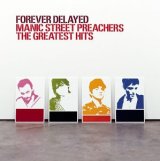
http://www.kindamuzik.net
ernaast
Onze laatste liverecensie.
Onze laatste albumrecensie.
Ons laatste interview.
Onze laatste video.
Manic Street Preachers | Forever Delayed - The Greatest Hits
A strange phenomenon.
CD, Sony/Sony
Tekst: Omar Muñoz-Cremers
Publicatiedatum: 18 november 2002

The Manic Street Preachers best-of collection starts off with their most touching lyrics, the one that, for me, encapsulated their charm. They are, of course, the first words of 'A Design For Life':
Libraries gave us power
Then work came and made us free
What price now for a shallow piece of dignity.
With 'A Design For Life,' the first post-Richey sound the band released, they became the sort of honest workmanlike band that releases best-of-albums. And however much they randomize the track listing, there will always run an abyss through their oeuvre, marked by the disappearance of Richey. 'A Design For Life," while musically a pleasurable anthem, is thematically the essence of the band: working class pride that can't be taken for granted but must be transcended through the use of knowledge. Indeed, the pleasure of the Manics for me always was a matter of reading, more than listening. From day one with Motown Junk, they sounded out-of-time, a competent if unspectacular reworking of punk and metal ideas. The talk of wanting to fuse Guns 'N Roses (medium) with Public Enemy (message) worked one-way, and to be really special, they should have turned the influences around from time to time. Their much-talked-about plan to release just one double album that would change, well, everything, was launched too soon. With a lack of tunes, the pretension crash landed, and so they were forced to begin a real career.
While they were a fun read in the early days, the band became fascinating when they lost some of their sloganeering zest and Richey James became more prolific as a spokesperson for the band. Beautiful, soft-spoken, and intelligent, he gave the best interviews of any rock artist that decade, without having any musical influence in the band. Lyrically, Richey took over, and, beginning with Gold >From The Soul and ending with The Holy Bible, he transformed a lost band into something unique: sharp commentators on the human condition, pop music, and social inequality. The albums and interviews were filled with references to Ballard, Nietzsche, Mirbeau, Foucault, Mishima, Plath, etc. Yet the lyrics and interviews also painfully tracked the downfall of a disturbed mind into the rather unglamorous mixture of anorexia, self-mutilation, and alcoholism, eventually leading up to his still-unsolved disappearance in The Year of Kurt.
The band would eventually continue without Richey and became more popular than ever; they lost their dark bite and consequently were embraced by MTV, while being praised for surviving with dignity. Listening to this overview, I still have trouble being seduced by their sound, the late-era power ballads and stadium rockers that, by far, outnumber the dark period pieces on this collection and sometimes have a spark of inspiration (especially 'The Masses Against The Classes' and the subtle new track 'There By The Grace Of God') but more often feel leaden ('If You Tolerate This Your Children Will Be Next' and 'The Everlasting' are the main offenders). To be honest, musically there is little that really enchants, out of the 20 tracks: 'You Love Us' was always clever, 'Faster' has a seductive punch, and best of all remains the haunting 'Kevin Carter' (a key text by Richey on the Richey mythos: his identification with the South African photographer who couldn't turn away from the blackest horror of a dead child being eaten by a vulture — his famous picture haunting him and eventually driving him to suicide — is uncanny). But for all their perceived importance, Manic Street Preachers often sound unspectacular, gray, not sharp enough to really cut, and always hampered by James Bradfield's thin voice, especially on their supposed masterpiece 'Motorcycle Emptiness' (contrast that, for instance, with his strongest vocal performance on 'Faster,' where his clipped voice sounds inhuman.) For someone who has never owned a Manics album, I was looking forward to hearing this collection, hoping that they would finally, through the genealogical method, also make sense sonically. On the contrary: Forever Delayed strengthens the feeling that Manic Street Preachers are closing a cycle, maybe entering a new, freer life as a band; yet, in the period contained on this album, they were a band you had to fantasize about rather than listen to. A strange phenomenon.
http://www.kindamuzik.net/recensie/manic-street-preachers/forever-delayed-the-greatest-hits/2067/
Meer Manic Street Preachers op KindaMuzik: http://www.kindamuzik.net/artiest/manic-street-preachers
Meer Manic Street Preachers op KindaMuzik:
» Live-recensie: Manic Street Preachers / Sleepers' Reign» Achtergrond: Manic Street Preachers: A Secret History... Door alle barricades heen
» Bezoek de Manic Street Preachers artiestpagina
Vind je Manic Street Preachers goed? Lees dan ook bij KindaMuzik over:
» Spiritualized» Aimee Mann
» Duran Duran








Deel dit artikel: